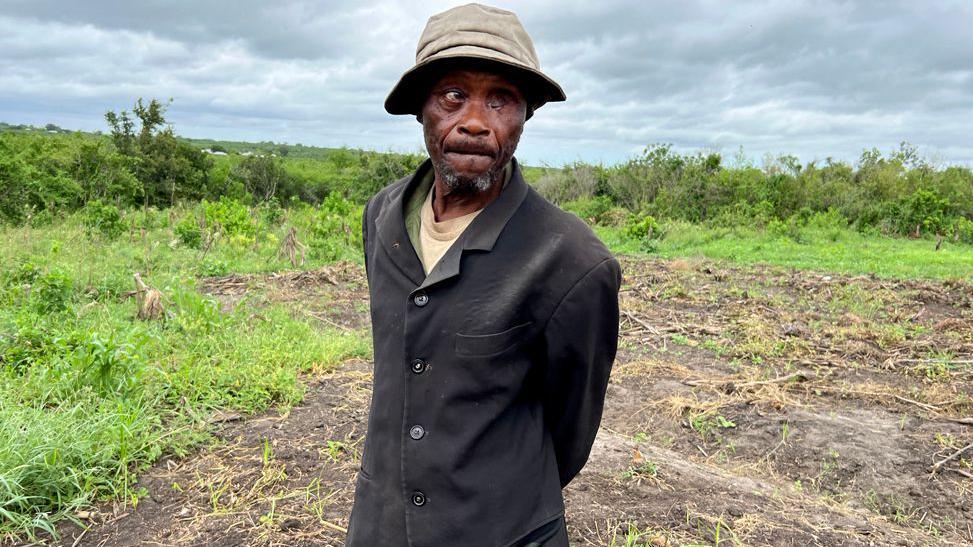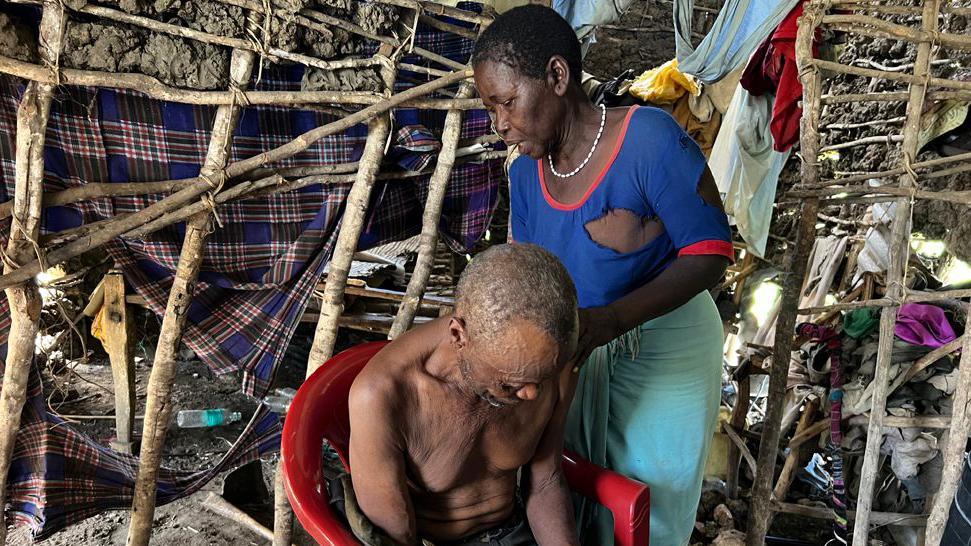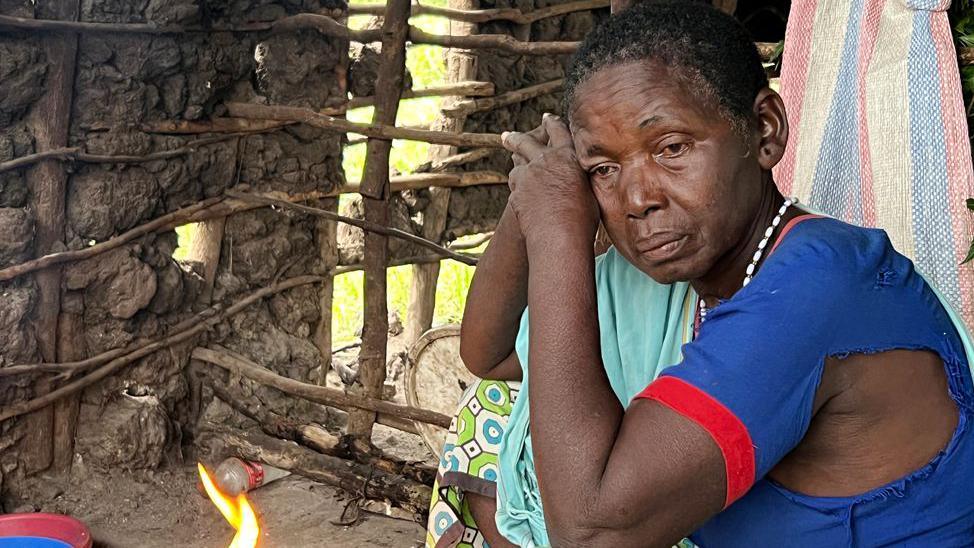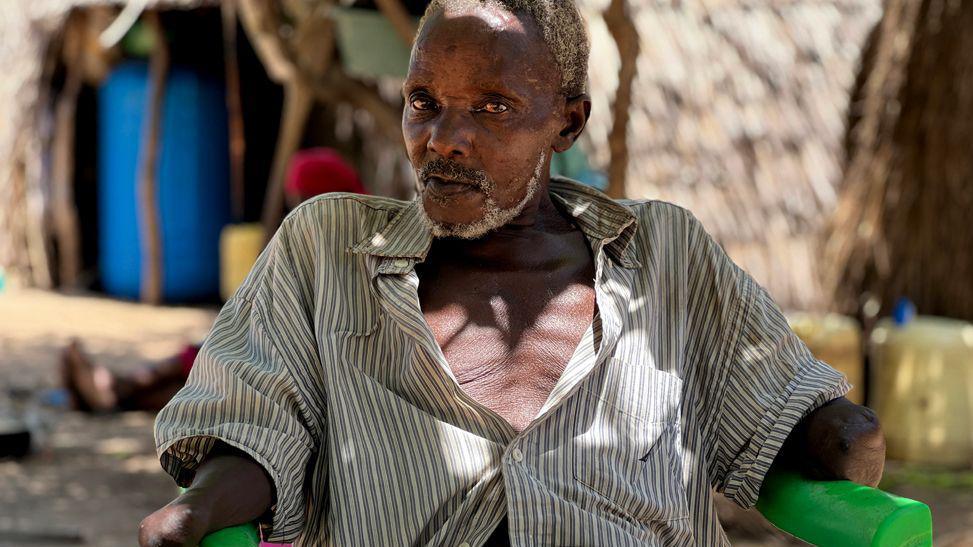Accused of witchcraft then murdered for land

Farmer Tambala Jefwa was left with one eye after an assault
- Published
BBC Africa Eye investigates a shocking spate of elderly people accused of witchcraft then murdered along Kenya’s Kilifi coast, and discovers the true motives behind the killings.
Seventy-four-year-old Tambala Jefwa stares vacantly out of his one remaining eye as his wife, Sidi, gently removes his shirt.
“They stabbed him with a knife like this and pulled,” she says pointing to the long scar stretching down from his collar bone.
She takes his head in her hands showing what happened in another attack. “They had to pull the scalp back and sew it together.”
Mr Jefwa was accused of being a witch and has been attacked twice in his home, 80km (50 miles) inland from the coastal town of Malindi. The first left him without an eye. The second nearly killed him.
The couple own more than 30 acres of land where they grow maize and raise a few chickens. There has been a dispute with family members over boundaries. They believe this was the real reason Mr Jefwa was almost killed, not that people genuinely believed he was a witch.
“I was left for dead. I lost so much blood. I don’t know why they attacked me, but it can only be the land,” says Mr Jefwa.

Sidi Jefwa shows the scars left by the attacks on her husband
Belief in witchcraft and superstition is common in many countries.
But in parts of Kenya, Malawi, Tanzania and South Africa, it can be used to justify killing elderly people to take their land.
A report called, The Aged, on Edge, by Kenyan human rights organisation Haki Yetu says one elderly person is murdered along the Kilifi coast every week in the name of witchcraft. Its programme officer, Julius Wanyama, says many families believe it is one of their own who orders the killing.
“They use the word witchcraft as a justification because they will get public sympathy. And people will say: ‘If he was a witch, it is good you have killed him.’”
Few people in this region have title deeds for their land. Without a will, they rely on passing it down customarily through the family. Mr Wanyama says seven out of 10 of the killings are elderly men because land ownership and inheritance lie with them.
“Historically people here in Kilifi do not have [land] documentation. The only document they have is the narrative from these elderly people. That is why mostly men are being killed, because once you kill them, then you have removed the obstacle,” says Mr Wanyama.

The Jefwas believe family members were behind the attacks
About an hour’s drive from the Jefwa family land is a rescue centre for the elderly run by the charity, Malindi District Association.
It is home to around 30 elderly people who have been attacked and are unable to go back to their own land.
Sixty-three-year-old Katana Chara, who looks much older than his years, has been here for around 12 months.
He had to move to the centre after he was attacked with a machete in his bedroom in April 2023. One hand was cut off at the wrist, the other just above the elbow. He can no longer work and needs help for the most basic tasks, from feeding and washing to dressing himself.
“I know the person who cut my hands, but we have never met face to face since,” he says.
Mr Chara was accused of being a witch over the death of another man’s child, but believes the real reason he was attacked was because of his six acres of land.
“I don’t have anything to do with witchcraft. I have one piece of land and it is at the seafront. It is a big piece of land.”

Katana Chara now lives in a shelter as he can no longer look after himself
Many of Mr Chara’s family members were questioned over the attack but no-one was ever prosecuted. Activist Mr Wanyama has been trying to get justice for him.
“Very few people have been charged on the allegations of killings of elderly. And that’s why I think even the key people who are involved in killing, they feel they are free.”
After months of investigating, BBC Africa Eye managed to track down an ex-hitman who claims to have killed around 20 people. He says the minimum he got paid for each murder was 50,000 Kenyan shillings – around $400 (£310).
“If someone kills an old person, know that their family paid for it. It must be their family,” he tells BBC Africa Eye.
Pushed on how and why he thought it was his right to take someone’s life, he responds: “I may have done something bad because I was given the job and it is me that killed, but according to laws, according to God, the person who sent me is the guilty one.”
The Kenya National Commission on Human Rights presented a document to the United Nations in February 2023 stating: “Witch burning, killings, and physical attacks are rife in regions such as Kisii in western Kenya and Kilifi county in coastal Kenya.”
It went on to say that younger family members seeking to acquire family land is a key motivating factor behind the killings. It said the attacks and killings increased during periods of drought and famine when sources of income become scarce.
Mr Wanyama says killings which use accusations of witchcraft to justify land grabs have become a “national disaster”
“It started as a regional issue, but now it has escalated... If we don’t address it, then we are losing our archives of the elderly. Those are the only live archives we can believe.”
In traditional African culture, the elderly are revered for their wisdom and knowledge.
In Kilifi, it is the reverse. Old people are so fearful of becoming a target, many dye their hair in an attempt to look younger.
It is rare for someone in this region to survive after being accused of witchcraft.
While Mr Chara is safe now he lives at the rescue centre for the elderly, for men like Mr Jefwa there is real fear that whoever tried to murder him will come back.
Watch the documentary Cry Witch: Take My Land, Take My Life, external on the BBC Africa YouTube channel or listen to the podcast on Assignment on the BBC World Service
More BBC Africa Eye stories:

Go to BBCAfrica.com, external for more news from the African continent.
Follow us on Twitter @BBCAfrica, external, on Facebook at BBC Africa, external or on Instagram at bbcafrica, external